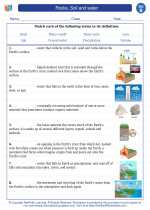Lakes
A lake is a large body of water that is surrounded by land. Lakes can be found all over the world and vary in size and depth. They are formed by a variety of processes including volcanic activity, glacial movement, and tectonic forces. Lakes are important ecosystems that support a wide range of plant and animal life.
Formation of Lakes
Lakes can be formed by several different processes:
- Glacial activity: During the last Ice Age, glaciers carved out basins in the Earth's surface, which later filled with water to form lakes.
- Volcanic activity: Some lakes are formed in volcanic craters, while others are created by lava flows that block existing river valleys.
- Tectonic forces: Earthquakes and the movement of the Earth's crust can create depressions that fill with water to form lakes.
- Human-made lakes: Reservoirs and ponds can be created by humans for various purposes, such as irrigation, drinking water, and recreation.
Lake Ecosystems
Lakes support a diverse range of plant and animal life. The types of organisms that inhabit a lake depend on factors such as water temperature, sunlight availability, and nutrient levels.
Common organisms found in lakes include:
- Plants: Aquatic plants such as water lilies, cattails, and algae play a crucial role in providing oxygen and food for other lake organisms.
- Fish: Lakes are home to a variety of fish species, including bass, trout, and catfish, which form an important part of the food chain.
- Invertebrates: Insects, crustaceans, and mollusks are abundant in lake ecosystems and are essential for maintaining the balance of the ecosystem.
Human Impact on Lakes
Human activities can have a significant impact on the health of lakes and their ecosystems. Pollution from agricultural runoff, industrial waste, and urban development can degrade water quality and harm aquatic life. Additionally, overfishing and the introduction of non-native species can disrupt the natural balance of a lake ecosystem.
Study Guide
Here are some key questions to consider when studying lakes:
- What are the different processes that can create lakes?
- How do the characteristics of a lake's ecosystem change with depth?
- What are some common plants and animals found in lake ecosystems?
- What are the main human activities that can impact the health of lakes?
- How can we protect and preserve lake ecosystems for future generations?
Understanding the formation, ecology, and conservation of lakes is essential for appreciating the ecological importance of these bodies of water and the need to protect them from human-induced threats.
[Lakes] Related Worksheets and Study Guides:
.◂Science Worksheets and Study Guides Second Grade. Rocks, Soil and water

 Worksheet/Answer key
Worksheet/Answer key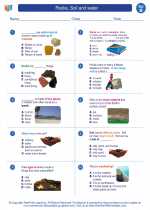
 Worksheet/Answer key
Worksheet/Answer key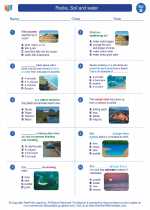
 Worksheet/Answer key
Worksheet/Answer key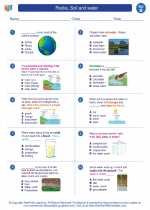
 Vocabulary/Answer key
Vocabulary/Answer key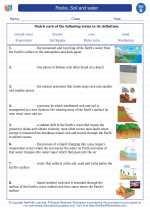
 Vocabulary/Answer key
Vocabulary/Answer key